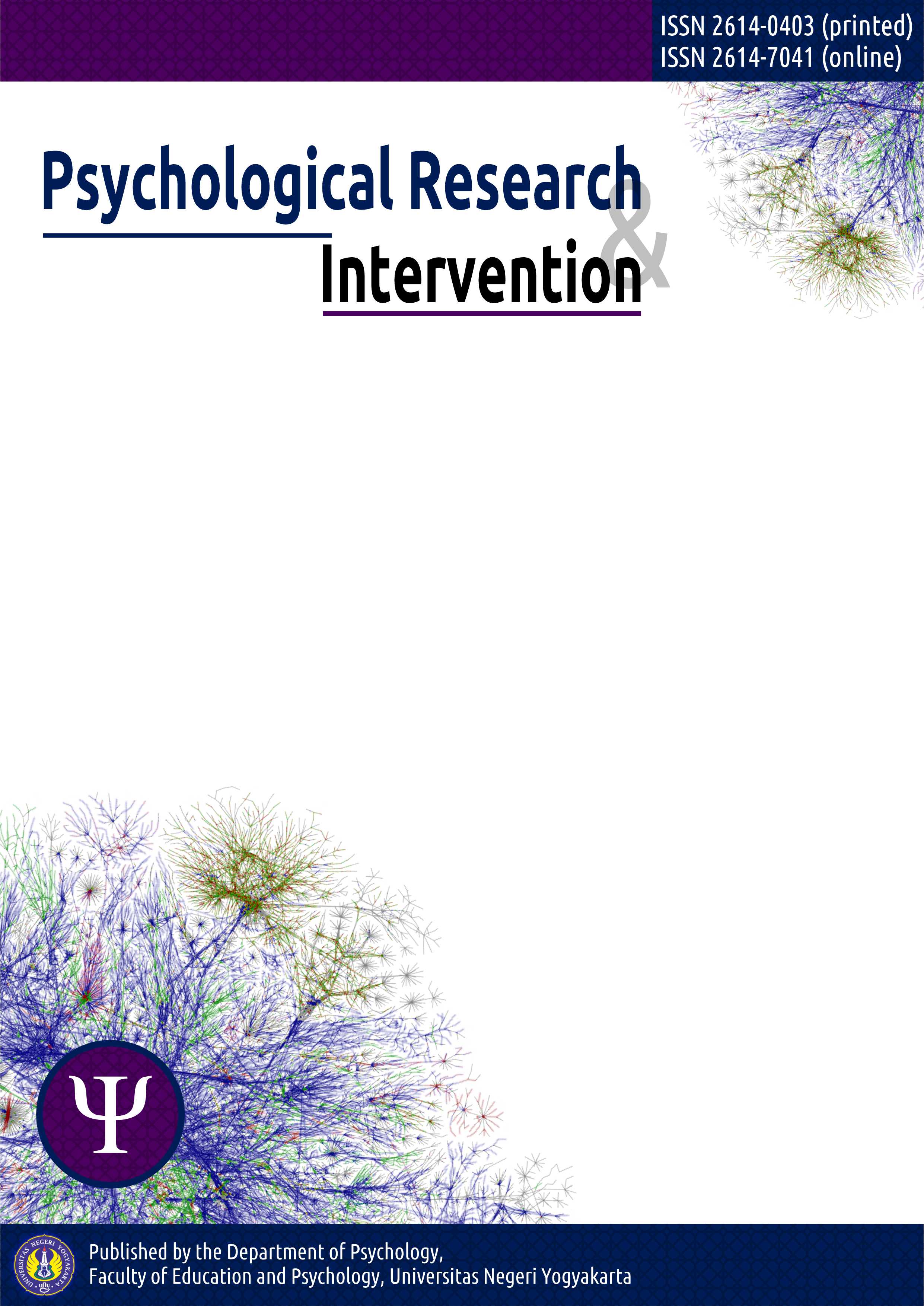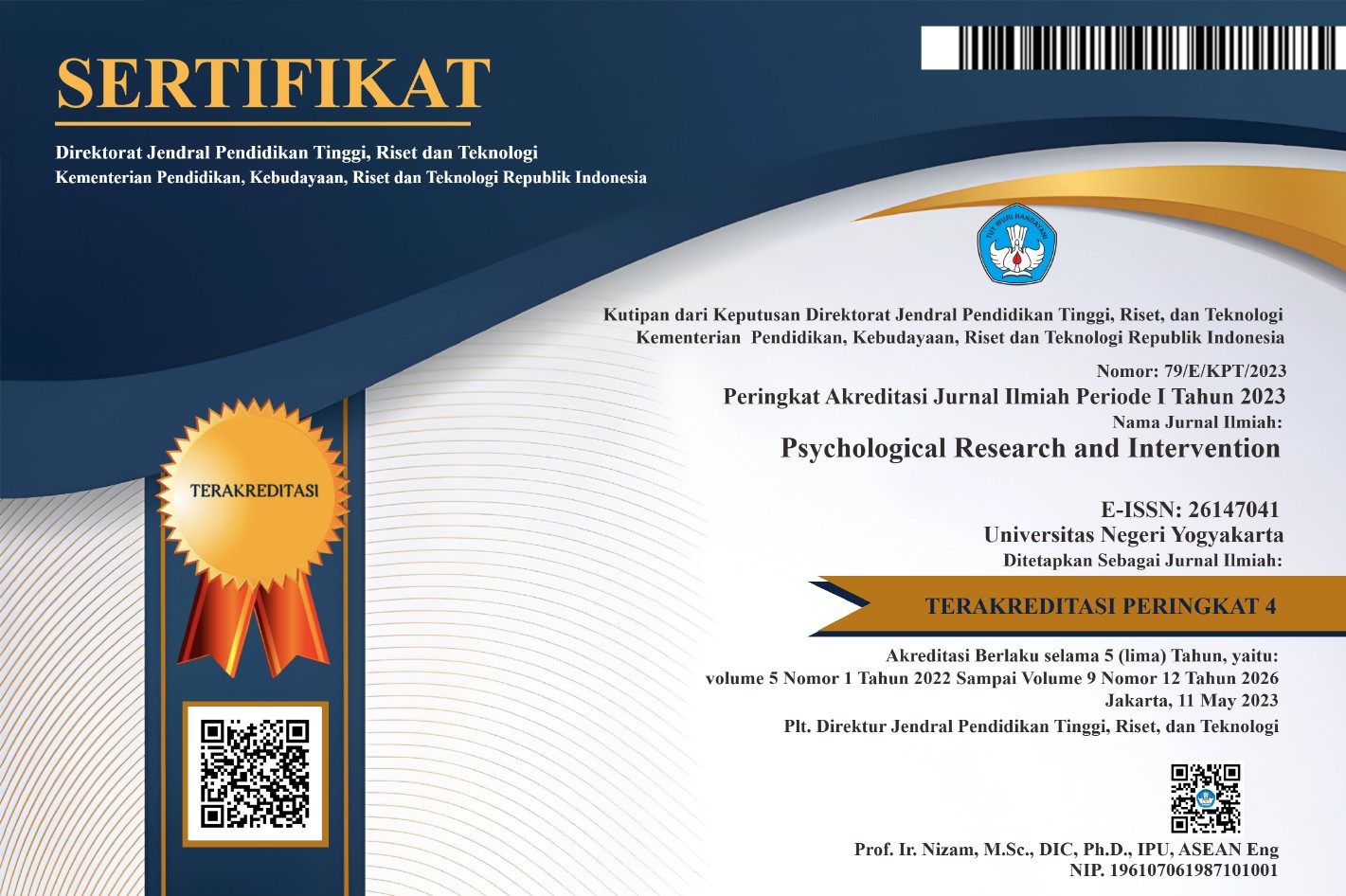Gratitude as a predictor of fear of missing out (FOMO) among digital native generation in Yogyakarta
DOI:
https://doi.org/10.21831/pri.v5i2.60541Keywords:
gratitude, FOMO, digital native generationAbstract
The Fear of Missing Out (FoMO) is widely experienced by individuals in the digital era. Various studies have shown that FoMO adversely affects on the physical and psychological conditions of individuals who experience it. On the other hand, some experts argue that gratitude can be a protective factor from the emergence of FoMO. This study aims to determine the role of gratitude on FoMO among digital native generation. This study used a quantitative approach, conducted in the Special Region of Yogyakarta (DIY) with an online survey through psytoolkit. This study was participated by 599 respondents with nonprobability accidental sampling method. The data collection tool used was the Fear of Missing Out (FoMO) scale and the Indonesian version of the gratitude scale. The data analysis technique used was simple linear regression analysis with the help of SPSS 24. The hypothesis of this study is accepted, that it is stated that there is an effect of gratitude on FoMO in digital native generation with a coefficient of determination by 0.077, which means that the effect of gratitude on FoMO is 7,7% with the regression line equation of Y= 49,248 + (-0,090)X.
References
Agarwal, S., & Mewafarosh, R. (2021). Linkage of Social Media Engagement With Fomo and Subjective Well Being. Journal of Content, Community and Communication, 13(7), 46–57. https://doi.org/10.31620/JCCC.06.21/06
Aisafitri, L., & Yusriyah, K. (2020). Sindrom fear of missing out sebagai gaya hidup Generasi Milenial di Kota Depok. Jurnal Riset Mahasiswa Dakwah Dan Komunikasi (JRMDK), 2(4), 166–177.
Alutaybi, A., McAlaney, J., Arden-Close, E., Stefanidis, A., Phalp, K., & Ali, R. (2019). Fear of Missing Out (FoMO) as Really Lived: Five Classifications and one Ecology. BESC 2019 - 6th International Conference on Behavioral, Economic and Socio-Cultural Computing, Proceedings. https://doi.org/10.1109/BESC48373.2019.8963027
Asosiasi Penyelenggara Jasa Internet Indonesia (2022). Profil Internet Indonesia 2022. Diunduh 11 Januari 2023 melalui https://apjii.or.id/survei/surveiprofilinternetindonesia2022
Baker, Z. G., Krieger, H., & LeRoy, A. S. (2016). Fear of missing out: Relationships with depression, mindfulness, and physical symptoms. Translational Issues in Psychological Science, 2(3), 275–282. https://doi.org/10.1037/tps0000075
Basiroen, V. J., & Hapsari, A. (2018). Creating an Awareness Campaign Against the Fomo Phenomenon in Young Adults' Social Media Usage. Humaniora, 9(3), 231. https://doi.org/10.21512/humaniora.v9i3.4725
Beyens, I., Frison, E., & Eggermont, S. (2016). "I Don't Want to Miss a Thing": Adolescents' Fear of Missing Out and its Relationship to Adolescents' Social Needs, Facebook Use, and Facebook Related Stress. Computers in Human Behavior, 64, 1–8.
Bharathi, N. S. (2020). FOMO Syndrome. International Journal of Advances in Nursing Management, 8(2), 171-174.
Budiyono, & Yoga, A. F. (2017). MENGGALI NILAI NILAI KEARIFAN LOKAL BUDAYA JAWA SEBAGAI SUMBER PENDIDIKAN KARAKTER. Prosiding SNBK (Seminar Nasional Bimbingan Dan Konseling), 1(1), 92–103. http://regional.kompas.com/read/201
D'Lima, P., & Higgins, A. (2021). Social media engagement and Fear of Missing Out (FOMO) in primary school children. Educational Psychology in Practice, 37(3), 320–338. https://doi.org/10.1080/02667363.2021.1947200
Elhai, J. D., Levine, J. C., Dvorak, R. D., & Hall, B. J. (2016). Fear of missing out, need for touch, anxiety and depression are related to problematic smartphone use. Computers in Human Behavior, 63, 509–516. https://doi.org/10.1016/j.chb.2016.05.079
Fahtoni, A. B., & Listiyandini, R. A. (2021). Kebersyukuran, Kesepian, Dan Distres Psikologis Pada Mahasiswa Di Masa Pandemi Covid-19. Journal of Psychological Science and Profession, 5(1), 11–19. https://doi.org/10.24198/jpsp.v5i1.29212
Faruq, F., Syahrina, H. M., Sabani, N., Rahmawati, S., & Sukmakarti, L. D. (2022). DAMPAK STRATEGI KOPING MASYARAKAT JAWA DI MASA PANDEMI COVID-19. Paradigma : Jurnal Kajian Budaya, 12(3), 334–342.
Gomez, M., Klare, D., Ceballos, N., Dailey, S., Kaiser, S., & Howard, K. (2022). Do You Dare to Compare?: The Key Characteristics of Social Media Users Who Frequently Make Online Upward Social Comparisons. International Journal of Human-Computer Interaction, 38(10), 938–948. https://doi.org/10.1080/10447318.2021.1976510
Kaczmarek, L. D., Kashdan, T. B., Drazkowski, D., Enko, J., Kosakowski, M., Szäefer, A., & Bujacz, A. (2015). Why do people prefer gratitude journaling over gratitude letters? The influence of individual differences in motivation and personality on web-based interventions. Personality and Individual Differences, 75, 1–6. https://doi.org/10.1016/j.paid.2014.11.004
Kemp, S (2022). Digital 2022: Indonesia. Diunduh pada 20 Februari 2022 dari https://datareportal.com/reports/digital-2022-indonesia
Kini, P., Wong, J., McInnis, S., Gabana, N., & Brown, J. W. (2016). The effects of gratitude expression on neural activity. NeuroImage, 128, 1–10. https://doi.org/10.1016/j.neuroimage.2015.12.040
Kuswaya, A., & Ma'mun, S. (2020). Misinterpretation of patience: An analytical study of nerimo concept within Indonesian Muslim society. Indonesian Journal of Islam and Muslim Societies, 10(1), 153–176. https://doi.org/10.18326/ijims.v10i1.153-176
Lambert, N. M., Fincham, F. D., Braithwaite, S. R., Graham, S. M., & Beach, S. R. H. (2009). Can Prayer Increase Gratitude? Psychology of Religion and Spirituality, 1(3), 139–149. https://doi.org/10.1037/a0016731
Listiyandini, R. A., Nathania, A., Syahniar, D., Sonia, L., & Nadya, R. (2015). Mengukur Rasa Syukur: Pengembangan Model Awal Skala Bersyukur Versi Indonesia. Jurnal Psikologi Ulayat, 2(2), 473. https://doi.org/10.24854/jpu22015-41
Luna, K. (2014). The psychology of fomo. Diambil dari: http://youbeauty. com/life/the-psychology-of-fomo.
McGinnis, P., J. (2020). Fear of Missing Out Tepat Mengambil Keputusan di Dunia yang Menyajikan Terlalu Banyak Pilihan. Jakarta: PT Gramedia Pustaka Utama.
Moyal, A., Motsenok, M., & Ritov, I. (2020). Arbitrary social comparison, malicious envy, and generosity. Journal of Behavioral Decision Making, 33(4), 444–462. https://doi.org/10.1002/bdm.2172
Mukhlis, H., & Koentjoro. (2015). Pelatihan Kebersyukuran untuk Menurunkan Kecemasan Menghadapi Ujian Nasional pada Siswa SMA. Gadjah Mada Journal of Professional Psychology, 1(3), 203–215.
Muller, D., & Fayant, M.-P. (2010). On Being Exposed to Superior Others: Consequences of Self-Threatening Upward Social Comparisons. Social and Personality Psychology Compass, 4(8), 621–634. https://doi.org/10.1111/j.1751-9004.2010.00279.x
Muna, Z., & Adyani, L. (2021). Analisis Kesehatan Mental Pada Lansia (Memahami Kebersyukuran Pada Lansia Muslim di Aceh Utara). Jurnal Psikologi Terapan (JPT), 3(1), 7. https://doi.org/10.29103/jpt.v3i1.3636
Musman, A. (2021). Berdamai dengan Efek Negatif Medsos. Yogyakarta: Anak Hebat Indonesia
Nurhayati, Yulia (2019) DINAMIKA FEAR OF MISSING OUT DALAM PENGGUNAAN INSTAGRAM PADA GENERASI MILENIAL MAHASISWA DI YOGYAKARTA. Other thesis, Universitas Pembangunan Nasional Veteran Yogyakarta.
Oberst, U., Wegmann, E., Stodt, B., Brand, M., & Chamarro, A. (2016). Negative consequences from heavy social networking in adolescents: The mediating role of fear of missing out Ursula Oberst a , ∗, Elisa Wegmann b, Benjamin Stodt b, Matthias Brand b, Andrés Chamarro c a Ramon Llull University, Barcelona, Spain b General P. Journal of Adolescense.
Prasetyo, N. H., & Subandi, M. A. (2014). PROGRAM INTERVENSI NARIMO ING PANDUM UNTUK MENINGKATKAN KESEJAHTERAAN PSIKOLOGIS KELUARGA PASIEN SKIZOFRENIA. Jurnal Intervensi Psikologi, 6(2), 151–170.
Przybylski, A. K., Murayama, K., Dehaan, C. R., & Gladwell, V. (2013). Motivational, emotional, and behavioral correlates of fear of missing out. Computers in Human Behavior, 29(4), 1841–1848. https://doi.org/10.1016/j.chb.2013.02.014
Putra, F. A. D. (2020). Karakteristik Generasi Z di Yogyakarta Tahun 2019. Skripsi. Universitas Sanata Dharma Yogyakarta.
Savitri, J. (2019). Pengaruh Fear of Missing Out terhadap Kesejahteraan Psikologis Individu Pengguna Media Sosial di Usia Emerging Adulthood. Skripsi. Universitas Negeri Yogyakarta.
Seligman, M. E. P., Steen, T. A., Park, N., & Peterson, C. (2005). Positive psychology progress: empirical validation of interventions. The American Psychologist, 60(5), 410–421. https://doi.org/10.1037/0003-066X.60.5.410
Siregar, T. K., Kamila, A. T., & Tasaufi, M. N. F. (2021). Kebersyukuran dan Kecemasan akan Masa Depan pada Mahasiswa Tingkat Akhir di Masa Pandemi Covid-19. Borobudur Psychology Review, 1(1), 29–37. https://doi.org/10.31603/bpsr.4881
Stillman, D & Stillman, J. (2018). Generasi Z: Memahami Karakter Generasi Baru yang Akan Mengubah Dunia Kerja. Jakarta: PT Gramedia Pustaka Utama.
Sugiyono (2019). Metode Penelitian Kuantitatif, Kualitatif, dan R&D. Bandung: Alphabet.
Vierginia, A., & Handayani, B. L. (2022). Pemaknaan Konsep Nrimo bagi Masyarakat di Wilayah Banjir Dusun Biting , Desa Kutorenon , Kabupaten Lumajang. Indonesian Journal of Sociology, Education, and Development, 4(2), 87–95.
Wang, H., Miao, P., & Jia, H. (2023). The Dark Side of Upward Social Comparison for Social Media Users : An Investigation of Fear of Missing Out and Digital Hoarding Behavior. 601. https://doi.org/10.1177/20563051221150420
Winata, C., & Andangsari, E. W. (2017). Dispositional Gratitude and Social Comparison Orientation among Social Media Users. Humaniora, 8(3), 229. https://doi.org/10.21512/humaniora.v8i3.3620
Wolniewicz, C. A., Tiamiyu, M. F., Weeks, J. W., & Elhai, J. D. (2018). Problematic smartphone use and relations with negative affect, fear of missing out, and fear of negative and positive evaluation. Psychiatry Research, 262(May 2017), 618–623. https://doi.org/10.1016/j.psychres.2017.09.058
Wulandari, N. A. T. (2015). FILOSOFI JAWA NRIMO DITINJAU DARI SILA KETUHANAN YANG MAHA ESA. Jurnal Ilmiah Pendidikan Pancasila Dan Kewarganegaraan, 2(2), 132–138.












